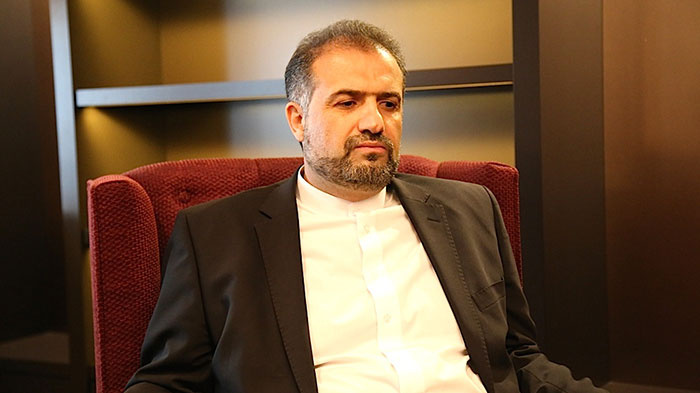Iran’s Presidential Campaigns to Focus on Nuclear Deal

His welcoming yet chilly office is decorated with an enlargement of him hung on one of the walls, snapped while he is jotting down some notes as he listens to an address by Majles’ Speaker Ali Larijani! His mantra: “I hate controversies”.
The chairman of Majlis Research Center, Kazem Jalali, instigated one of the most heated controversies just some five months ago when he stabbed Principlists in the back by joining the opposite camp’s List of Hope.
In an extensive interview with the Principlist Young Journalists Club, this close political affiliate of Ali Larijani has discussed an array of subjects ranging from the roster of the tenth parliament, the Rouhani administration’s achievements, and the 2017 presidential race, to Ahmadinejad and the dealings between the two foremen in charge of executive and legislative branches of the government.
Commenting on the Rouhani administration’s achievements, he hailed the nuclear deal and the peaceful domestic atmosphere shaped by the government, but branded economy as the Achilles’ Heel of the cabinet. Even though he admits that some of the country’s regulations, including those of attracting foreign investment and the monetary system, should be specifically rectified to serve the post-sanctions era, he puts the blame on the administration as he believe it is up to the cabinet to take measures and submit a bill to the parliament.
When asked to offer his views on the administration’s social base and popularity, Jalali points out to increasing demands partly brought up through the administration’s maneuver in tying everything to the JCPOA. In spite of everything, he says the deal is a time-consuming issue that has already played a significant part in resolving economic problems. Noting the Supreme Leader’s emphasis on resistance economy however, he says Iran should avoid seeing sponging off foreigners as resolution to its economic woes. “This is a false supposition because the West is considered our enemy and their animosity remains unaltered,” he adds.
The elites of the country are aware of how remarkable the nuclear deal was, Jalali says. Nonetheless, he believes the same argument cannot be made by the lower strata of the society because they see the nuclear dossier as a concluded deal and are impatient to enjoy what was promised to happen afterwards. “The JCPOA was a strategic decision on the establishment’s part. Of course, the Supreme Leader tries to regularly bring up his demands to the ‘tyrant’ world [i.e. the West]. We should learn from the Supreme Leader, stop belittling ourselves in the face of the global arrogance, and highlight our demands,” YJC quotes Jalali as saying.
Stressing that competition in the upcoming presidential race will be more intense, Jalali tells the Principlist YJC that media fervor can be decisive in the same way that it turned out to be pivotal in the recent parliamentary election, particularly in Tehran. On the other hand, Iran has just gone through the nuclear deal which is a turning point, leading the country into the post-sanctions era. Jalali puts forward two conflicting theories of the day on JCPOA: “One is that we should wait for some developments to take place; and the other is that nothing will come out of the nuclear deal and we should stop hoping for change. The two theories cause an intellectual confrontation. In the 2016 [parliamentary] election, the nuclear deal was at its peak value in the eyes of public opinion so part of the gains by the [moderate-reformist coalition’s] List of Hope was indebted to the nuclear deal and the deal-makers behind it. In the 2017 presidential race, the JCPOA will expose itself to some extent and the confrontation between the proponents and opponents of the deal could be a story.”
Asked about recent gestures made by ex-President Mahmoud Ahmadinejad, he declined to make predictions but offered some insight. “He will either run himself or tries to pull the rug from under Rouhani’s feet, and have someone else to run in order to determine the results,” he said. “In the places he visits, he receives popular welcome. The best thing to do is to conduct a public opinion survey to see how much each individual or group weighs,” he added.
* This is a translation of select segments from Kazem Jalali’s interview with the Young Journalists' Club, a news agency affiliated with Jam-e Jam, Iran's state-tun TV & Radio corporation.

